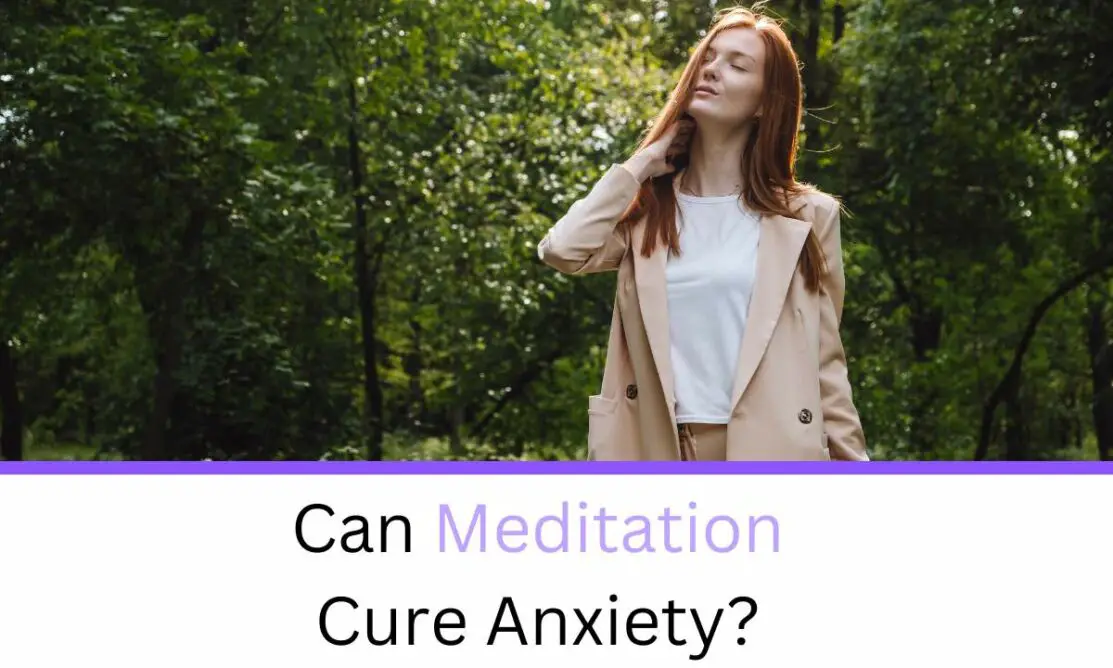Meditation has been used for centuries as a way to reduce stress and anxiety. In recent years, there has been an increased interest in the potential of meditation to help treat anxiety.
Evidence suggests that it can be an effective tool in managing anxiety symptoms.
This article will explore the potential of meditation to help reduce anxiety and provide tips on how to get started.
Can meditation cure anxiety?
If you’re struggling with anxiety, you may be wondering if meditation can help.
The answer is yes! Meditation can be a powerful tool for managing anxiety and reducing stress.
Meditation is the practice of focusing your attention on a particular object, thought, or activity.
It can help you become more aware of your thoughts and feelings, and it can help you gain control over them.
When you meditate, you can learn to recognize when your thoughts are causing you anxiety and then take steps to manage them.
Studies have shown that regular meditation can reduce anxiety levels and improve overall mental health.
It can help you become more mindful of your thoughts and feelings, and it can help you gain control over them.
It can also help you become more aware of your body and how it responds to stress.
Meditation can also help you develop healthier coping strategies for dealing with anxiety.
It can help you learn to recognize when your thoughts are causing you anxiety and then take steps to manage them.
It can also help you become more aware of your body and how it responds to stress.
If you’re looking for a way to manage your anxiety, meditation is definitely worth a try.
It can help you become more mindful of your thoughts and feelings, and it can help you gain control over them.
It can also help you develop healthier coping strategies for dealing with anxiety. So give it a try and see how it works for you!

How to Incorporate Meditation into Your Anxiety Treatment Plan
If you’re struggling with anxiety, you’ve probably heard that meditation can be a great way to help manage your symptoms.
But how do you actually incorporate meditation into your anxiety treatment plan? Here are some tips to get you started.
1. Start small. Don’t try to meditate for hours at a time. Start with just a few minutes each day and gradually increase the amount of time you spend meditating.
2. Find a comfortable spot. Find a quiet place where you can sit or lie down comfortably. Make sure you’re not too hot or cold and that you won’t be disturbed.
3. Focus on your breath. Close your eyes and focus on your breath. Notice the sensation of the air entering and leaving your body.
4. Let go of thoughts. When thoughts come up, don’t try to push them away. Acknowledge them and then let them go.
5. Be kind to yourself. Don’t be too hard on yourself if you find it difficult to meditate. Just keep practicing and you’ll get better with time.
Meditation can be a great way to help manage your anxiety symptoms. With a little practice, you can incorporate it into your anxiety treatment plan and start to feel the benefits.
The Science Behind Meditation and Anxiety: What the Research Says
If you’ve ever felt overwhelmed by anxiety, you’re not alone. Anxiety is one of the most common mental health issues in the world, and it can be incredibly debilitating.
Fortunately, there’s a growing body of research that suggests meditation can be an effective tool for managing anxiety.
So, what is the science behind meditation and anxiety? Let’s take a look at what the research says.
First, it’s important to understand that anxiety is a complex issue. It can be caused by a variety of factors, including genetics, environment, and lifestyle.
That said, research suggests that meditation can be an effective way to reduce anxiety.
One study found that mindfulness meditation can reduce anxiety symptoms in people with generalized anxiety disorder.
The study found that after eight weeks of mindfulness meditation, participants had significantly lower levels of anxiety than those who did not meditate.
Other studies have found that meditation can reduce stress and improve mood.
One study found that people who meditated for eight weeks had lower levels of the stress hormone cortisol than those who did not meditate.
Finally, research suggests that meditation can help people manage their anxiety in the long-term. the same study found that people who meditated for eight weeks had lower levels of anxiety even six months after the study ended.
Overall, the research suggests that meditation can be an effective tool for managing anxiety.
It can help reduce stress and improve mood, and it may even help people manage their anxiety in the long term.
Of course, it’s important to remember that meditation is not a cure-all for anxiety.
It’s important to talk to a mental health professional if you’re struggling with anxiety.
But if you’re looking for a way to manage your anxiety, meditation may be worth a try.
Exploring the Benefits of Mindfulness Meditation for Anxiety Relief
Are you feeling overwhelmed by anxiety? You’re not alone. Anxiety is one of the most common mental health issues in the world, and it can be incredibly debilitating.
But there is hope! Mindfulness meditation is a powerful tool that can help you manage your anxiety and find relief.
What is Mindfulness Meditation?
Mindfulness meditation is a type of meditation that focuses on being present in the moment.
It involves paying attention to your thoughts, feelings, and physical sensations without judgment. This helps you become more aware of your thoughts and feelings, and it can help you gain control over them.
How Can Mindfulness Meditation Help with Anxiety?
Mindfulness meditation can help reduce anxiety in several ways. First, it can help you become more aware of your thoughts and feelings.
This can help you recognize when your anxiety is starting to rise, so you can take steps to manage it.
Second, mindfulness meditation can help you develop a more positive outlook on life.
It can help you focus on the present moment and appreciate the good things in your life. This can help you feel more relaxed and less anxious.
Finally, mindfulness meditation can help you develop healthier coping strategies for dealing with anxiety.
It can help you learn to accept your thoughts and feelings without judgment, and it can help you develop healthier ways of responding to them.
How Do I Get Started with Mindfulness Meditation?
Getting started with mindfulness meditation is easy!
All you need is a quiet place and a few minutes of your time. Here are some tips to help you get started:
• Find a comfortable position. You can sit in a chair, lie down, or even stand up.
• Close your eyes and focus on your breath. Notice the sensation of the air entering and leaving your body.
• Pay attention to your thoughts and feelings without judgment. Notice them without trying to change them.
• When your mind wanders, gently bring your attention back to your breath.
• Practice for a few minutes each day.
Mindfulness meditation can be a powerful tool for managing anxiety. Give it a try and see how it can help you find relief!
How Meditation Can Help Reduce Anxiety Symptoms
If you’re feeling overwhelmed by anxiety, you’re not alone. Anxiety is one of the most common mental health issues, and it can be incredibly debilitating.
But there are ways to manage your anxiety symptoms, and one of the most effective is meditation.
Meditation is a practice that has been used for centuries to help people relax and reduce stress.
It involves focusing on your breath and allowing your thoughts to come and go without judgment. By taking a few moments each day to meditate, you can help reduce your anxiety symptoms and gain a sense of control over your emotions.
When you meditate, you’re training your mind to be more aware of your thoughts and feelings.
This can help you recognize when you’re feeling anxious and take steps to manage it.
For example, if you notice that your thoughts are racing, you can take a few deep breaths and focus on your breath to help calm your mind.
Meditation can also help you become more mindful of your body and how it’s responding to stress.
You may notice that your heart rate increases or that your muscles tense up when you’re feeling anxious.
By becoming aware of these physical sensations, you can take steps to relax your body and reduce your anxiety.
Finally, meditation can help you gain perspective on your anxiety. When you take a step back and observe your thoughts and feelings, you can gain a better understanding of why you’re feeling anxious and how to manage it.
If you’re looking for a way to reduce your anxiety symptoms, give meditation a try.
It’s a simple practice that can have a big impact on your mental health.
Conclusion
In conclusion, while meditation can be a helpful tool in managing anxiety, it is not a cure-all.
It is important to remember that anxiety is a complex condition that requires a multifaceted approach to treatment.
Meditation can be a valuable part of a comprehensive treatment plan, but it should not be relied upon as the sole solution.



